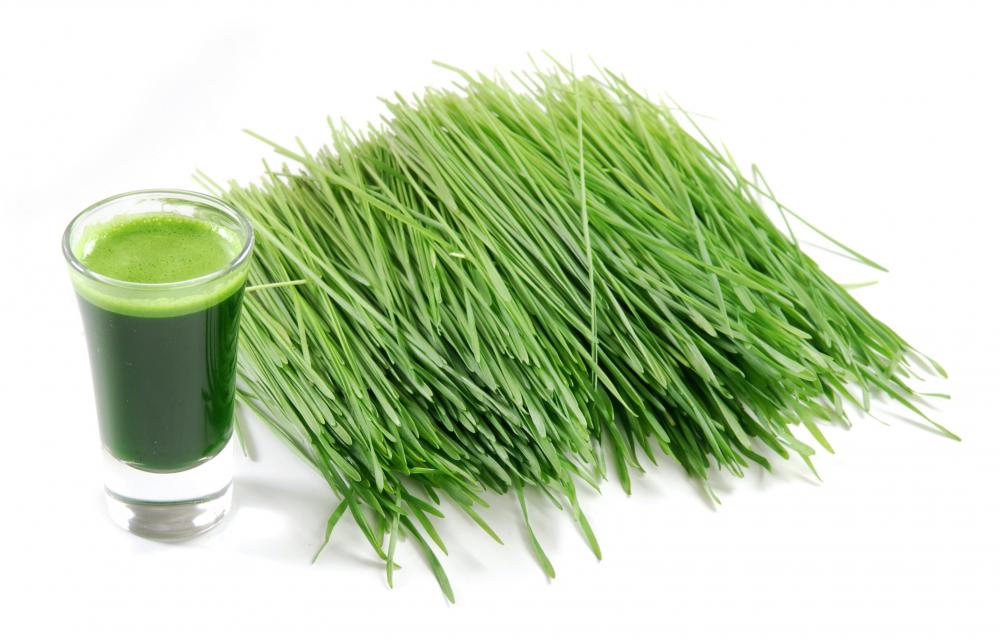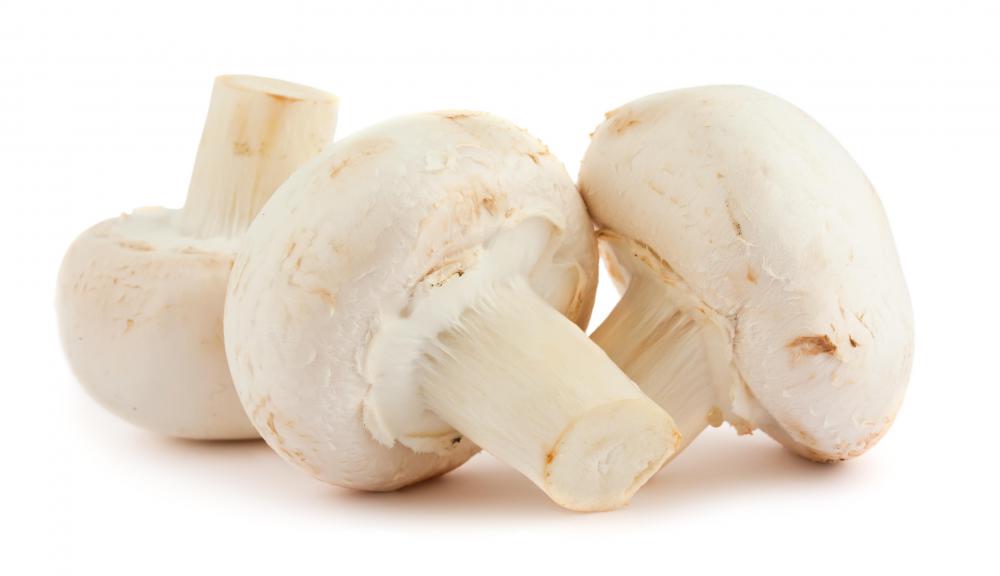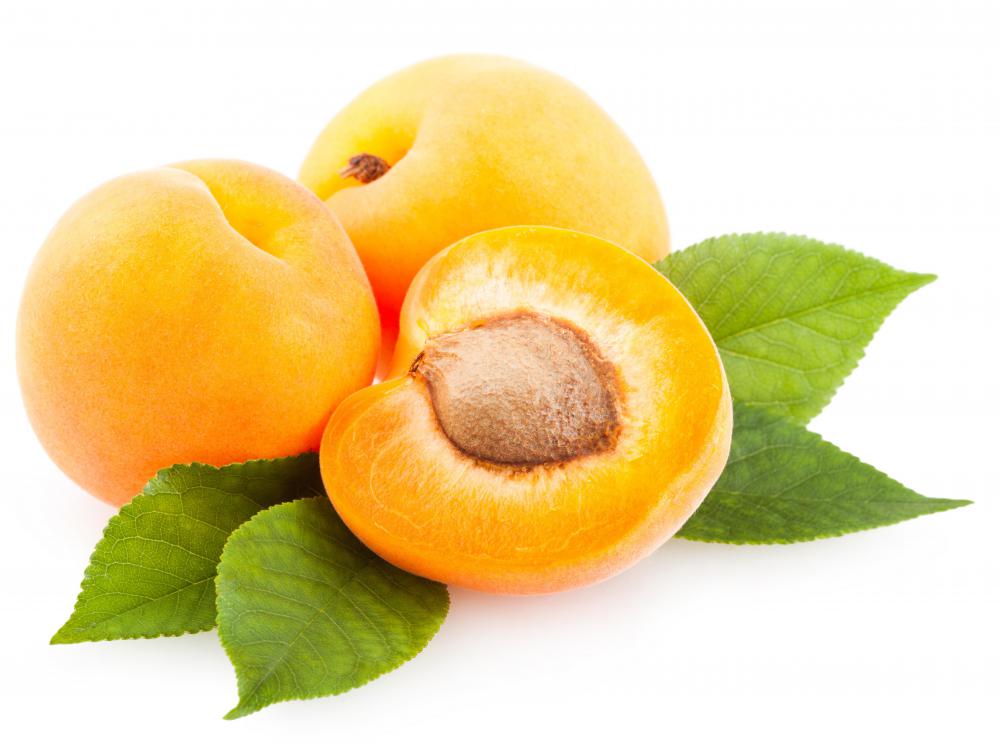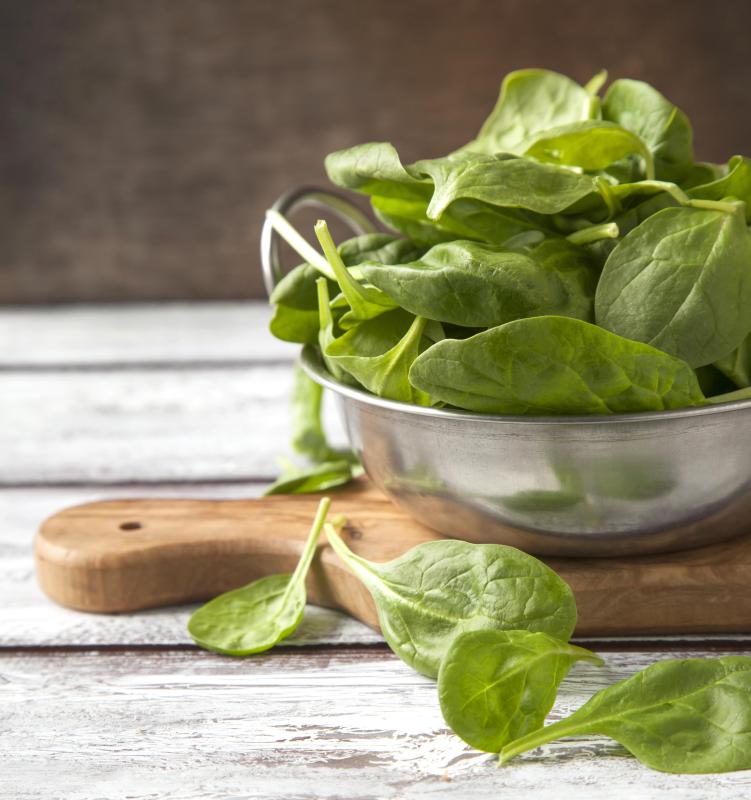At TheHealthBoard, we're committed to delivering accurate, trustworthy information. Our expert-authored content is rigorously fact-checked and sourced from credible authorities. Discover how we uphold the highest standards in providing you with reliable knowledge.
What Are Blood Building Foods?
The term blood building foods is commonly used in alternative medicine, particularly in Traditional Chinese Medicine (TCM). Blood building foods are those foods that contain high quantities of specific nutrients thought to encourage the production of new blood cells in the body. The most important ingredient in a blood building food is iron, but vitamin B12 and folic acid are also key.
Although many choose simply to strengthen the blood by taking iron pills or liquid iron supplements, eating a diet high in blood building foods can be equally effective. Some blood building foods are less appetizing than others, and though they are food, they are generally taken as a supplement rather then simply eaten as a meal. These include foods like animal liver, brewer’s yeast, bone marrow soup, and black strap molasses. Colostrum, the milk produced in mammals during the late stages of pregnancy, is also considered a blood building food. Colostrum is high in antibodies and nutrients needed by newborn mammals to build blood after birth.

If these options seem unappetizing, there are a number of blood building foods which may have wider appeal to the palate. These include meats, particularly duck, goose, lamb, and oyster. Dark leafy greens, such as spinach and wheatgrass, are also particularly high in iron, and are considered a blood building food. Wheatgrass, and other foods such as raisins, prunes, kidney beans, mushrooms, apricots, and soy foods can be particularly effective in building blood, especially if one is following a vegetarian diet.

The iron-rich foods listed above are considered particularly potent in blood building potential. Hypothetically speaking, however, any food that is high in nutrients is beneficial to the blood. Of course, if one wants to encourage the production of healthy new blood cells, it is also wise to stay away from those foods that offer little nutritional value, or rob the body of nutrients. Foods such as refined sugar, coffee, and alcohol are often thought to rob nutrients from the body, not to mention the taxing effect they can have on the liver.

Within the practice of TCM, herbs are also commonly recommended in a blood building regimen. Though they may not be foods in and of themselves, herbs, spices and extracts taken to build blood are often derived from foods, or other edible substances. These include ingredients such as licorice, ginger, red dates, citrus, cardamon, and alfalfa.
Blood building foods, due to their high concentration of iron, vitamin B12, and folic acid, are an effective way to relieve anemia, fatigue, paleness, coldness of the body, and amenorrhea.
Why Is It Important To Eat Blood Building Foods?

Blood building foods are not only a natural part of balanced nutrition, but they also maintain health and hasten recovery. Eating blood building foods helps counteract health conditions or special medical treatments that cause low blood counts. Low blood counts can show up as low red blood cell counts, low white blood cell counts, low platelet counts, or a combination of the three.
Blood Building Foods Help Prevent Anemia

Anemia is the name of the condition characterized by low red blood cell count. There are many different types of anemia; some are curable with nutritional or medical therapies, and others can be critical. Symptoms of anemia include but are not limited to:
- Fatigue
- Trouble concentrating
- Confusion
- Loss of appetite
- Pale or pallid complexion
- Rapid heart rate
- Trouble breathing
Blood Building Foods Help Prevent Neutropenia
Neutropenia is the condition of having a low white blood cell count. Inconsistent white blood cells are also indicative of other health issues. Symptoms of neutropenia include but are not limited to:
- Frequent urination
- Painful urination
- Bladder infections
- Frequent fevers
- Congestion
- Skin sores and infections
- Mouth lesions
Blood Building Foods Help Prevent Thrombocytopenia
Thrombocytopenia is diagnosed when you have a low platelet count. Low platelet counts can sometimes be dangerous because blood loss is a concern depending on how efficiently your blood clots. Symptoms of neutropenia include but are not limited to:
- Bruise easily
- Bleed easily
- Rapid bleeding
- Heavy menstrual periods
- Nose bleeds
- Small, red spots under skin called petechiae
- Clotting issues
How Many Servings of Blood Building Foods Should You Eat a Day?
The recommended number of servings for blood building foods in one day is dependent on more than one factor.
Blood Building Food for Blood Deficiencies
First, patients must determine whether or not they have typical blood work or if they have a blood deficiency. The medical care team will then work to prescribe supplements and blood building foods if additional support is needed.
- Zinc
- Iron
- B vitamins
- Folate
- Protein
Blood Building Food for Typical Blood Work

For people who have typical blood work results and do not need additional support, following the basics of the nutritional guidelines recommended by the USDA in conjunction with their medical provider and any nutritional goals is likely enough to maintain healthy blood. However, if they have a history of blood illnesses or deficiencies, adding more blood building nutrients into regular dietary rotation is ideal for preventative treatment.
Understanding Servings for Blood Building Food

In addition to supplements, patients can swap out less nutrient-dense options for choices rich with blood building properties. Since blood building nutrients are a natural part of each major food group, following nutritional guidelines under doctor advice is often enough to meet the ideal servings. However, not everyone is aware of which foods contain what nutrients and will need additional support and education from their healthcare team before making decisions on their own.
Protein
The amount of protein recommended for adults is based on body weight. For every two pounds of body weight, an adult requires 0.8 grams of protein daily.
- Chicken
- Turkey
- Egg whites
- Fish
- Beef
- Kidney beans
- Yogurt
- Cheese
Folate
The recommended daily intake of folate or folic acid is 400 mcg. Folate is readily found in dark, leafy greens.
- Spinach
- Broccoli
- Romaine lettuce
- Brussels sprouts
- Liver
- Asparagus
- Sunflower seeds
Iron
The average iron intake should be between 17 to 20 milligrams per day for typical, active adults, depending on weight and sex. The iron amounts for children, pregnant and lactating women, and older people vary slightly.
- Sardines
- Dark chocolate
- Lentils
- Beans
- Potato with skin
- Enriched grains
- Beef liver
- Pumpkin seeds
B Vitamins

A mix of B vitamins is not harmful to the body in moderate to high quantities if patients confirm intake with their doctors or primary care teams. However, to combat fatigue and maintain good blood health, the recommended dosage of vitamin B12 is at least 2.8 mcg for adults per day.
- Shellfish
- Enriched plant-based milk
- Beef
- Chickpeas
- Poultry
- Fortified nutritional yeast
- Yogurt
- Fortified breakfast cereals
How Much Iron Is Too Much?
There are two primary types of iron overload. One means there might be a little too much nutrient-dense iron food or supplements in your body. The other is diagnosed as hemochromatosis, which causes the body to store excess iron. If you have any symptoms of iron overload, contact your doctor to determine the best solution.
- Fatigue
- Weakness
- High blood sugar
- Abdominal pain
- Hyperpigmentation
- Loss of libido
- Weight loss
- Constipation
What Causes Low Red Blood Cell Counts?
Sometimes, it's normal for red blood cell counts to be a little low. It is especially common in women during menstruation or when they're pregnant. Sometimes, though, low red blood cell counts are due to other issues.
One of the most common causes of low red blood cell counts is anemia. Sometimes, anemia doesn't change the number of cells but will cause them to be too large, too small, or simply unhealthy. Anemia may develop over time or may come on quickly, and symptoms may be so mild that you barely notice them or very severe. Common symptoms of anemia include fatigue, pale skin, feeling dizzy, headaches, irritability, low blood pressure, or rapid heart rate. Left untreated, anemia can become severe and lead to fainting, feeling short of breath, and organ damage or failure.
There are a number of causes that lead someone to become anemic. Some of the most common causes include a deficiency of vitamin B12, an iron deficiency, gastrointestinal disorders, chronic bleeding, or severe malnutrition. Other possible causes are bone marrow disorders, kidney disease, cancer, or undergoing chemotherapy.
Some other situations that may lead a person to have a low blood cell count include Hodgkin's lymphoma, hypothyroidism, lead poisoning, or rheumatoid arthritis, among other disorders.
What Vitamins and Minerals Does Your Body Need To Maintain a Proper Red Blood Cell Count?
To maintain the proper blood cell count, your body needs the right combination of vitamins and minerals and in the right amount. This means that you need to eat the right kind of blood-building food.
- Copper – Copper is important for the body to produce hemoglobin. You can get the right amount by eating leafy green vegetables, mushrooms, oysters, nuts, or organ meats.
- Folic Acid – Also referred to as vitamin B9, folic acid helps the body to make red blood cells. You can find folic acid in leafy green vegetables, such as spinach, as well as in beans, liver, and seafood.
- Iron – Iron helps the body to produce hemoglobin and can be found in seafood, beans, leafy green vegetables, and red meats.
- Vitamin A – Found in carrots, fish, leafy green vegetables, potatoes, and liver, vitamin A helps the body make enough red blood cells.
- Vitamin B12 – Another vitamin that helps the body to produce red blood cells, vitamin B12 can be found in beef, fish, eggs, dairy products, and chicken.
- Vitamin C – Vitamin C helps your body to metabolize the iron you ingest so that it makes hemoglobin. You can get vitamin C from citrus fruits, leafy green vegetables, tomatoes, broccoli, and strawberries.
- Vitamin E – Another vitamin that helps red blood cell production, you can get vitamin E when you eat pine nuts, bell peppers, almonds, or avocado.
With the number of foods that have the vitamins and minerals that you need, you may be worried that you'll produce too many red blood cells. Luckily, your body works to make sure this doesn't happen by eliminating any excess nutrients.
What Else Can You Do To Maintain a Healthy Amount of Red Blood Cells?
While eating blood-building food is an important part of keeping your red blood cell count where it should be, there are other things that you can do to ensure your count is at a healthy amount as well.
Perhaps the most important one is to exercise. Your body thrives when you are moving it regularly. In fact, exercise stimulates erythropoiesis, which is the scientific term for producing red blood cells. Exercising helps old red blood cells to break down more quickly and be recycled, which allows more oxygen to reach the new cells. Whether you hit the gym every day or spend a few hours a week chasing your kids around the backyard, any type of exercise is beneficial.
It is also important to consider how much alcohol you drink. Alcohol interferes with how well your body can absorb the vitamins and minerals that it needs to maintain a healthy amount of red blood cells. Drinking in excess can also damage your kidneys and liver, which further decreases the number of red blood cells that your body can create. Limiting alcohol or removing it from your diet completely can contribute not only to healthier blood cells but to overall improved health.
When Is an Appropriate Time To See a Doctor?
If you suspect that you have anemia or another disorder that could be decreasing your red blood cells, it never hurts to make an appointment with your doctor. He or she can help you find the root of the problem, come up with a treatment plan, and if necessary, prescribe medication that will help you to feel better.
AS FEATURED ON:
AS FEATURED ON:


















Discussion Comments
I've been feeling kind of weak. Anemia probably. I started eating some pinto beans, liverwurst, garlic and herb spaghetti, olive loaf bread, chicken noodle soup with spinach and hot chocolate. Don't know if it helped, but I feel better.
You should eliminate wheat germ and wheatgrass as they contain the red cell clotting wGA lectin found in all grass seeds and sprouts.
Here is a list that I found for blood building foods: barley, (organic to avoid GMO), corn, oats, rice, wheat, bran, (organic to avoid GMO), alfalfa sprouts, artichokes, beets, button mushrooms, cabbage, celery, dandelion leaf, dark leafy greens, kelp, shiitake mushrooms, spinach, watercress, wheatgrass, apples, apricots, avocados, dates, figs, grapes, longan, mulberry beans, abzuki, soya, kidney nuts and seeds, almonds and black sesame, fish, mussels, octopus, oysters, sardines and tuna, all red meat, especially bone marrow and liver (beef, pork and sheep), dairy, chicken, egg, herbs and spices, nettle and parsley oils, amasake and molasses (unsulphured). Soymilk, algae, dongui and pollen supplements.
@shell4life – I know that my diet doesn't include enough of these foods, so I gave in and started taking vitamins years ago. I eat fruits and vegetables, so I stay healthy, but I just don't get as much iron as I should.
The vitamins keep my blood supplied with the nutrients it needs, while the fiber from the fruits and vegetables keeps other things running smoothly. Though there may not be a lot of iron or B12 in these foods, they do offer a variety of other essential nutrients, so I continue to eat them regularly. I just have to rely on my vitamins, too.
I didn't know that ginger and cardamom were blood building spices! That makes me feel better, because I drink spicy chai tea every night, and it contains both.
While it tastes nothing like liquid iron supplements that I've tried in the past, it is still good for me. In fact, it is probably even more useful, because I drink it daily, and I can't stand the taste of the supplements, so I quit using them long ago.
Whew! I was glad to read kidney beans on the list here. I was beginning to think that I had never consumed any blood building food until I saw that.
I don't like any of the meats mentioned in the article. I eat only white meat, which isn't as high in iron. However, I eat kidney beans a few times a week, so I think I'm okay.
Also try molasses. It is very high in Iron gives you about 50 percent of your daily needs in one tablespoon. You can also add it to foods like baked beans and sweets like cookies and hot cereals. I add it to cream of wheat or malt o meal which is also very high in iron. Brussel sprouts are another great source of iron.
I was extremely low on iron and started taking iron supplements twice a day (check with your doctor first for your needs) and took one tablespoon of molasses twice a day and I started feeling better immediately. Also make sure you take iron supplements on an empty stomach or they won't absorb properly. It is also best, I have read, to take with Vitamin B12 or it won't absorb. Red meat, chicken and pork are still the best forms and absorb easier than that derived from a plant source.
This is good to know. I lost a lot of blood today, to the point where I passed out and had a seizure and almost ended up going to the ER.
My blood is very low, so please help me.
Guys keep up the good work!
@cmsmith10: Does he like fruit? Some fruits that are high in fiber are dates, peaches, pears, raisins, and figs. I bake muffins and add high iron fruits and it seems to go over well with my children. Purple grape juice is always a hit, too.
I also fix snack trays with fresh berries and cucumbers. These are a good source of iron.
My son is a very picky eater. His pediatrician told me to try to incorporate more iron into his diet. I can assure you that he won't eat spinach or any other greens. What can I try?
Almost all beans, not just kidney beans, are high in iron. Red meats and turkey too, are pretty high in iron.
If you have picky kids, nuts are good for iron and keep your eye out for General Mills cereals, they have redone most of their kids cereals to include extra fiber and iron.
Post your comments